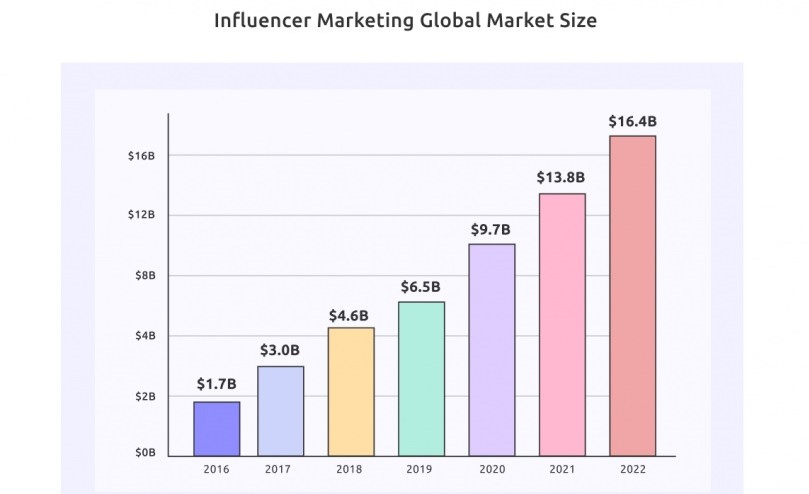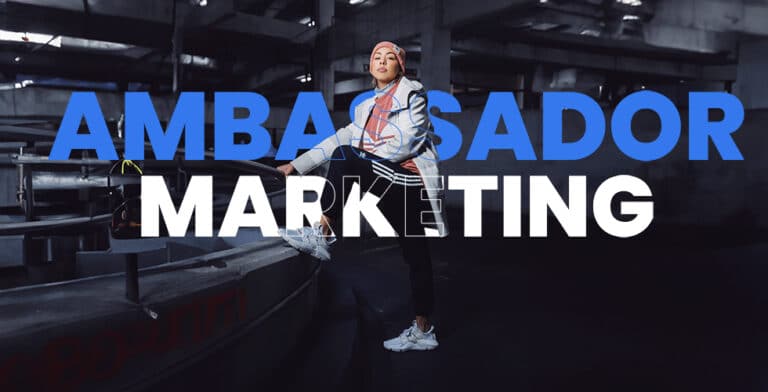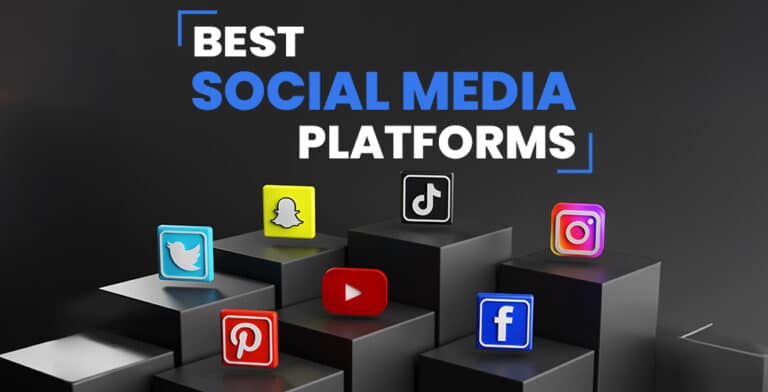Influencer marketing is important for branding because it lets brands reach a specific target audience through the support of influential people. Influencers have built up a loyal following of people who trust their opinions and suggestions. This makes them very good at promoting a brand’s products or services.
Influencers’ reliability and trustworthiness help firms attract new customers. Influencer marketing promotes a product or service and raises brand exposure, customer engagement, and income. In general, influencer marketing is an effective strategy for expanding online visibility and consumer demand.
How Is Influencer Marketing Affecting Branding?
Influencers promoting a product or service have increased dramatically in recent years. Brands can take advantage of the social proof that influencers already have by partnering with those who already have a large number of engaged fans.
Recognition Of The Brand
Influencer marketing has an impact on brands in many key ways. Brands may expand their reach and get more attention by forming partnerships with social media influencers with a sizable fan base. Further, influencers’ high levels of interaction with their followers are key to increasing brand recognition.
Enhanced Interaction With Customers
Improvements in consumer interaction are another manner in which influencer marketing is influencing brand perception. Businesses may tap into their followers’ trust and deliver a more real, accessible experience by partnering with important individuals. A closer relationship with the customer base can increase brand loyalty.
Improved Reliability And Authority
Brand reputation and trustworthiness may be improved via influencer marketing as well. Followers are more likely to trust a brand if an influential person backs it up. This is because followers see the endorser as a reliable source of information. Brands that are just starting or aren’t as well-known as others may greatly benefit from this.
Increased Diversity
Influencer marketing is also affecting brands by making them seem more genuine. Consumers in the modern era of the internet are more fond of more conventional forms of advertising and instead seek more genuine and personal writing pieces. Influencer partnerships allow marketers to tap into this authenticity and produce content that feels more real and relevant to their audience.
Boosts Return On Investment (ROI)
Last but not least, influencer marketing can boost a company’s ROI. When compared to more conventional types of promotion, influencer marketing tends to be more economical, and it also has the potential to increase the quality and quantity of visitors to a brand’s website. Furthermore, influencer marketing may boost sales and earnings for a company.

How Can Influencer Marketing Affect Brand Loyalty And Credibility?
Many studies and researches have shown that influencer marketing may substantially affect consumer trust and brand loyalty. By partnering with influential people with a large fan base, brands can gain credibility and trust from people who might buy their products.
MuseFind found that 92% of customers put more faith in an influencer’s opinion than in advertisements or other conventional forms of celebrity endorsement. An additional poll by Tomoson indicated that for every dollar invested in influencer marketing, firms saw a return of $6.50.
Influencer marketing is a potent weapon to gain the confidence, credibility, and loyalty of one’s target audience. Studies and research reveal that using influential people to promote a company may greatly boost that brand’s reputation and customer loyalty. Increased brand loyalty is one of the benefits that may come from brands capitalizing on the reputation and trustworthiness of influencers to forge deeper connections with their target audience.
Establishing Trust
When an influencer endorses a product, their audience is more likely to view that product favorably because they see the endorser as someone trustworthy. Collective Bias conducted a survey and discovered that 84% of respondents trusted suggestions from “real people” more than they did commercials. Customers are more inclined to buy from a company they believe in, which may boost brand loyalty.
Increased Reliability
One other way that influencer marketing may assist a business is by increasing its respectability. According to research, influencer marketing may significantly boost brand reputation and perceived value. According to this research, consumers trust a brand more if a well-known figure in their niche supports it.
Building Strong Relationships
Brands may strengthen their connections to their core customers by collaborating with influential members of that demographic. The University of Utah conducted studies showing that using influential people to promote a brand may significantly boost consumer commitment to that brand. The research shows that people are more likely to buy a brand’s product that an influencer recommends if they know the influencer personally.
Authenticity
When it comes to fostering customer loyalty, authenticity is more important than ever. Influencer marketing may assist with that. According to research, influencer marketing has significantly boosted brand legitimacy. Consumers are more likely to trust a brand if a well-known person in their social circle has promoted it.
Scope And Limitations Of Influencer Marketing On Branding
Influencer marketing includes using influencers’ reach and credibility to raise brand awareness, get more leads, and make more sales. Now more than ever, people rely on social media as their principal means of staying in touch with the rest of the world. To compete for today’s born-digital consumers’ attention, many businesses have shifted their focus to digital advertising.
However, firms must use novel advertising strategies to attract customers’ attention. Influencer marketing is in step with modern shopping habits. This allowed for the possibility of naturally and empathetically broadening vistas. According to the 2020 report “The State of Influencer Marketing,” the impact of influencer marketing on sales was 18% higher in 2019 than in 2018. New developments in influencer marketing are expected to emerge in abundance in the coming year of 2021.
The market size for influencer marketing platforms is expected to increase. Ad-blocking software is becoming more popular among internet consumers. Therefore, in 2023, firms may reach their target demographics through the vast reach of influence marketing.

- Limitations: The following are some limitations of influencer marketing that can be detrimental to branding:
- Issues in calculating return on investment: The ROI of an influencer marketing campaign may be hard to calculate because of the difficulty of measuring the direct effect of an influencer’s efforts on sales and brand indicators.
- Can not be adopted by all brands: It’s possible that influencer marketing won’t reach the right people or be effective for all kinds of goods and services.
- Influencer fraud is possible: Some influencers may lie about how many people they reach and how much they interact with them, which could affect the reputation of the company they work for.
- Relevance to target markets is dependent: An influencer campaign will only work if the audience of the influencer and the target market of the brand is the same.
- Failure to be authentic: When influencers aren’t invested in the business or product, their endorsements might appear insincere and boring to consumers.
- Depending on the actions of the influencer: If incorrect or scandalous, the influencer’s actions might damage the brand’s image and credibility.
Pros of influencer marketing for branding
- Recognition of the brand has grown:
The goal of influencer marketing is to raise awareness of a company by capitalizing on the popularity and trustworthiness of popular opinion leaders. In 2016, Guess collaborated with Gigi Hadid, a supermodel, to advertise their apparel line on various social media platforms. Over one billion impressions were made thanks to the campaign, which boosted brand recognition.
- Credibility and trust are enhanced
The credibility and respectability of a brand may benefit from an influencer’s reputation and respectability within their fan base.
- Direct advertising:
By analyzing the demographics and interests of an influencer’s followers, marketers can target consumers with their advertising more precisely. In 2019, Puma partnered with the rapper J. Cole to promote a new shoe collection. Specifically, the ad was aimed at a demographic of young, metropolitan customers.
Cons of influencer marketing on branding
- The wrong types of influencers can have a negative impact:
Companies may spend time and money finding the right influencer. If you don’t collaborate with the correct influencers, it might damage your reputation. Moreover, brands might lose money because of poorly executed influencer marketing campaigns.
- Ad agencies are certain to make blunders when they learn to use influencer marketing:
Since there is no specific guide to being successful in the marketing process, most companies learn from their successes and failures.
- Very time-consuming:
Building an influencer marketing strategy that meets its objectives take time and money. A brand should research and find an influencer who fits with the image of its brand. Write up agreements for your partnership, support the content created by your influencer, and evaluate the performance of your campaigns. Influencer marketing works best when you put in the time and money to do it well.
- Probability of Failure:
Influencer marketing strategies rarely produce the results that their creators hope for. If influencers can’t consistently produce high-quality content, they probably won’t connect with your ideal consumers. Time and money spent in such a way will be wasted.
- Influencer Fatigue:
Shoppers will have to make tough decisions as they learn who to trust as social media platforms like Facebook and Instagram grow saturated with sponsored promotions and influencers. In reality, just around 5% of people trusted the information that influencers provided on social media. Trends suggest that once-influential groups have less influence over today’s consumers, even when they work with organizations that are good fits as partners.
Future Of Influencer Marketing And How It Can Transform Branding
Influencer marketing will become smarter, more targeted, and more honest. Brands like micro-influencers because they are relatively affordable and more real. AI will be used more and more to find, target, and measure the effectiveness of influencer marketing.
Brands that create digital avatars or characters to represent their brand and promote their products will be able to do so more cheaply and with more control over the message. Also, influencer content, like user-generated reviews, will play a bigger role in showing social proof and making people trust products more. Overall, influencer marketing will continue to be an effective way for brands to reach their target audiences, build trust, and drive sales, but brands will need to be honest and open in their campaigns.





